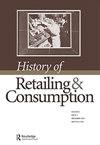Reinterpreting shopping in the Enlightenment: retail practices, consumer experiences, governance
Q2 Arts and Humanities
引用次数: 1
Abstract
ABSTRACT This new special issue on consumption and shopping practices in the eighteenth-century, takes further steps in reinterpreting the Enlightenment period in north-western Europe. The five papers assembled here will take the reader in new and often exciting directions with a shared concern to uncover under-studied source material and a willingness to explore and thematize shopping and consumption from a fine-grained and detailed historical perspective. The commodity culture of the Enlightenment will be analyzed to discover how it was embodied, enacted and perceived in its own time and context. In what follows, the reader will be introduced to toy- and bookshops in Enlightenment England; the role of provincial fairs; the way illicit goods were instrumental in tying consumer and retailers together in late eighteenth century Sweden; and, finally, learn more about subsequent phases of regulation and deregulation of the Viennese food markets around 1800. The following articles make the important implicit claim that shopping cultures in the Enlightenment worked ‘differently’, according to other cultural value schemes, conventions and norms than our own. These often-hidden cultural contexts remain in dire need to be resuscitated by uncovering new sources, doing careful methodological analysis, and by creatively connecting new findings to already existing knowledge.重新解读启蒙运动中的购物:零售实践、消费者体验、治理
这个关于18世纪消费和购物习惯的新特刊进一步解释了西北欧的启蒙时期。这里汇集的五篇论文将带读者进入新的、经常令人兴奋的方向,共同关注发现未被研究的原始材料,并愿意从细致而详细的历史角度探索和主题化购物和消费。我们将分析启蒙运动的商品文化,以发现它在自己的时代和背景下是如何体现、制定和感知的。接下来,读者将被介绍到英国启蒙时期的玩具书店和书店;省级博览会的作用;在18世纪晚期的瑞典,非法商品将消费者和零售商联系在一起;最后,了解更多关于1800年前后维也纳食品市场的监管和放松管制的后续阶段。下面的文章提出了一个重要的隐含主张,即启蒙运动时期的购物文化是“不同的”,它依据的是与我们不同的文化价值体系、习俗和规范。这些经常被隐藏的文化背景仍然迫切需要通过发现新的来源,进行仔细的方法分析,并创造性地将新的发现与已有的知识联系起来来复苏。
本文章由计算机程序翻译,如有差异,请以英文原文为准。
求助全文
约1分钟内获得全文
求助全文
来源期刊

History of Retailing and Consumption
Arts and Humanities-History
CiteScore
0.50
自引率
0.00%
发文量
3
 求助内容:
求助内容: 应助结果提醒方式:
应助结果提醒方式:


